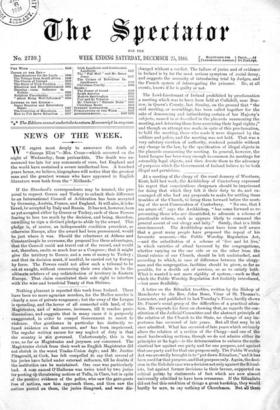At a meeting of the clergy of the rural deanery
of Westbere, Kent, held last week, the Archbishop of Canterbury expressed his regret that conscientious clergymen should be imprisoned for doing that which they felt it their duty to do, and en- couraged all who had any proposals to make for settling these troubles of the Church, to bring them forward before the meet- ing of the next Convocation of Canterbury. "No one, that I am aware of," says the Archbishop, "has come forward as re- presenting those who are dissatisfied, to advocate a scheme of practicable reform, such as appears likely to command the general assent of our clergy and laity." Surely, that is% little over-innocent. The Archbishop must have been well aware that a great many people have proposed the repeal of his favourite measure,—the Public Worship Regulation Act, —and the substitution of a scheme of 'live and let live,' in which varieties of ritual favoured by the congregations, whether varying on the one side or on the other from the literal rubrics of our Church, should be left undisturbed, and according to which, in case of difference between the clergy- man and the congregation, facilities should be given, so far as possible, for a double set of services, so as to satisfy both. What is wanted is not more rigidity of system,—such as that which the Public Worship Regulation Act foolishly introduced, —but more flexibility.


































